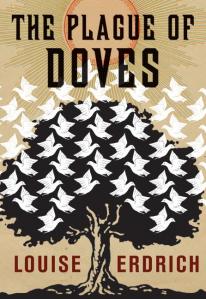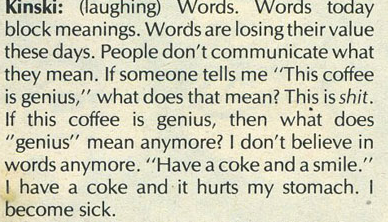5 hidden to lurk on the furky lake
11. Decent collection of James Thurber fables. Dude had a series of glass eyes he would change out at parties, each one for his drink level at the time, each a little bit more red-eyed. He also had an American flag glass eye. He would go to the bathroom, toss in the flag eye, reenter the party.
5. Holy shit! Jeff either snagged the shark, lost his best spoon, or this:
About two weeks ago I tried living as if I were an indie writer.
Oh, the writerly worries of “going indie.” Though it’s one of those things where genre writers think indie means genre. As if genre is subversive. Or indie. Or that they correlate. Or something. Some tidbits, though, or why would I even yawn it here?
14444. Aimee Bender interview in Guernica.
1. Avant-Garde time capsule found.
9. Is caffeine important to the writer? How much do you use?
While we’re on the subject of me, seven musically inclined friends of mine wrote songs inspired by my new book, The Moon Tonight Feels My Revenge. You can listen to them on the book’s Bandcamp page. You can pick a favorite. You can go here to my blog and vote on that favorite. The song that gets the most votes wins the musician a hardcover copy of The Moon Tonight Feels My Revenge.
Let’s Keep It Real
 I’m a little obsessed with this New York magazine article about James Frey. He has a fiction factory where he enters into partnerships with writers that may or may not pay off for both parties involved.The advance is $250 up front followed by another $250, it’s pretty ludicrous. You may or may not get credit for your work. You can’t audit so you’ll never know how much you really should be making on royalties. Here’s the contract which is both cynical and corrupt but if you’re a sentient adult who signs this contract you get what you get. Writer Maureen Johnson weighs in on the more troubling aspects of that contract. John Scalzi writes an open letter to MFA programs about educating writers on the actual business of writing that is one of the best conversations about this topic I’ve ever seen.** The folks at Pop Matters have an opinion. Then there’s this guy who basically says, “This is the reality of publishing.” I was going to write a big long post about this topic but then I changed my mind. Let’s get real. I think most of us, at some point or another in our careers, would have considered signing this contract and getting into bed with James Frey. Before I knew any better, I would have. As I read the article, a part of me thought, “I’d work for Frey. Where do I sign up?” I have student loans, man. My student loans have loans. I would let Frey be my rainmaker. I have too much of an ego to not get credit for my work so I dismissed those thoughts pretty quickly, but they were there and frankly, I think a lot of writers were/are thinking the very same thing. That is a sad commentary on how indebted and poorly compensated most of us are. I am equally certain that even with all this negative press, Frey will never stop having a supply of writers. His business model will continue to succeed for the same reason people continue to pay $20 per submission to Narrative and enter writing contests and otherwise pay to be published. The desire to be published, for some, is so desperate and so intense they will do whatever it takes. Frey knows this. He knows this and is comfortable with exploiting that desperation by creating a Ponzi scheme or a lottery, where he dangles the hope of commercial success in the faces of the relatively hopeless. One of the reasons we’re all so up in arms about this whole thing is because of what we’re willing to do. We’re not comfortable with that.
I’m a little obsessed with this New York magazine article about James Frey. He has a fiction factory where he enters into partnerships with writers that may or may not pay off for both parties involved.The advance is $250 up front followed by another $250, it’s pretty ludicrous. You may or may not get credit for your work. You can’t audit so you’ll never know how much you really should be making on royalties. Here’s the contract which is both cynical and corrupt but if you’re a sentient adult who signs this contract you get what you get. Writer Maureen Johnson weighs in on the more troubling aspects of that contract. John Scalzi writes an open letter to MFA programs about educating writers on the actual business of writing that is one of the best conversations about this topic I’ve ever seen.** The folks at Pop Matters have an opinion. Then there’s this guy who basically says, “This is the reality of publishing.” I was going to write a big long post about this topic but then I changed my mind. Let’s get real. I think most of us, at some point or another in our careers, would have considered signing this contract and getting into bed with James Frey. Before I knew any better, I would have. As I read the article, a part of me thought, “I’d work for Frey. Where do I sign up?” I have student loans, man. My student loans have loans. I would let Frey be my rainmaker. I have too much of an ego to not get credit for my work so I dismissed those thoughts pretty quickly, but they were there and frankly, I think a lot of writers were/are thinking the very same thing. That is a sad commentary on how indebted and poorly compensated most of us are. I am equally certain that even with all this negative press, Frey will never stop having a supply of writers. His business model will continue to succeed for the same reason people continue to pay $20 per submission to Narrative and enter writing contests and otherwise pay to be published. The desire to be published, for some, is so desperate and so intense they will do whatever it takes. Frey knows this. He knows this and is comfortable with exploiting that desperation by creating a Ponzi scheme or a lottery, where he dangles the hope of commercial success in the faces of the relatively hopeless. One of the reasons we’re all so up in arms about this whole thing is because of what we’re willing to do. We’re not comfortable with that.
**As an aside, it would also be useful to talk about how many small presses/magazines are publishing without contracts, or with crappy contracts, a scenario where, in the long run, everyone is vulnerable.
If you like Wallace Stevens
Greg Gerke is curating a week-long tribute to Wallace Stevens set to include interviews with and tributes by James Longenbach, James Robison, Ken Sparling, Eleanor Cook (author of The Reader’s Guide to Wallace Stevens), Cooper Renner, Me, William Walsh, Jamie Iredell and others. Check it out.
Nassim Nicholas Taleb on Writing

Writing is the art of repeating oneself without anyone noticing.
If you want people to read a book, tell them it is overrated.
Most people write so they can remember things; I write so I can forget.
You know you have influence when people start noticing your absence more than the presence of others.
It is the same with language. Language is largely made to show-off, gossip, confuse people, delude them, charm them, seduce them, scare them, exploit them, etc. And, as a side effect, convey information. Just a side effect, you fools.
An idea starts to be interesting when you get scared of taking it to its logical conclusion.
The test of originality for an idea is not the absence of one single predecessor, but the presence of multiple but incompatible ones.
Beauty is enhanced by unashamed irregularities; magnificence by a facade of blunder.
Gun, Gramophone, Violin, Bawling Baby
First paragraph from Louise Erdrich’s Plague of Doves:
The gun jammed on the last shot and the baby stood holding the crib rail, eyes wild, bawling. The man sat down in an upholstered chair and began taking his gun apart to see why it wouldn’t fire. The baby’s crying set him on edge. He put down the gun and looked around for a hammer, but saw the gramophone. He walked over to it. There was already a record on the spindle, so he cranked the mechanism and set down the needle. He sat back down in the chair and picked up his work as the music flowed into the room. The baby quieted. An unearthly violin solo in the middle of the record made the man stop, the pieces of the gun in his hands. He got up when the music was finished and cranked the gramophone and put the recording back on. This happened three times. The baby fell asleep. The man repaired the gun so the bullet slid nicely into its chamber. He tried it several times, then rose and stood over the crib. The violin reached a crescendo of strange sweetness. He raised the gun. The odor of raw blood was all around him in the closed room.
You Are Not the Only One Writing About Mondavian Zookpeepers
This is one of about 30 “Random” posts on the front page, but here goes nothing: Chloe Cooper Jones conducts a pretty spectacular dialogue with co-stars George Saunders and Deb Olin Unferth over at The Faster Times. Inspiring considerations of the contemporary MFA program abound. George Saunders gives us the only googlable instance of “kicking entities,” which we ought to deem an idiom among idioms, even if I’m not sure what it means. Really, the hope here gets me giddy, and it’s something for sure of which this “literary culture” could use a more healthy supply. Deb Olin Unferth puts it beautifully:
You can look at any space, at any group of people, and see dreariness, self-absorption, the long trod to death. Or you can look at the same space and people and see longing, hope, heroism, and disappointment that will break your heart. If you squint just right at an MFA program, you see both. You see the lifeless side—maybe the student who isn’t finding her voice or the teacher who is just “going through the motions”—and the side that shines and beats.
November 15th, 2010 / 11:06 pm



